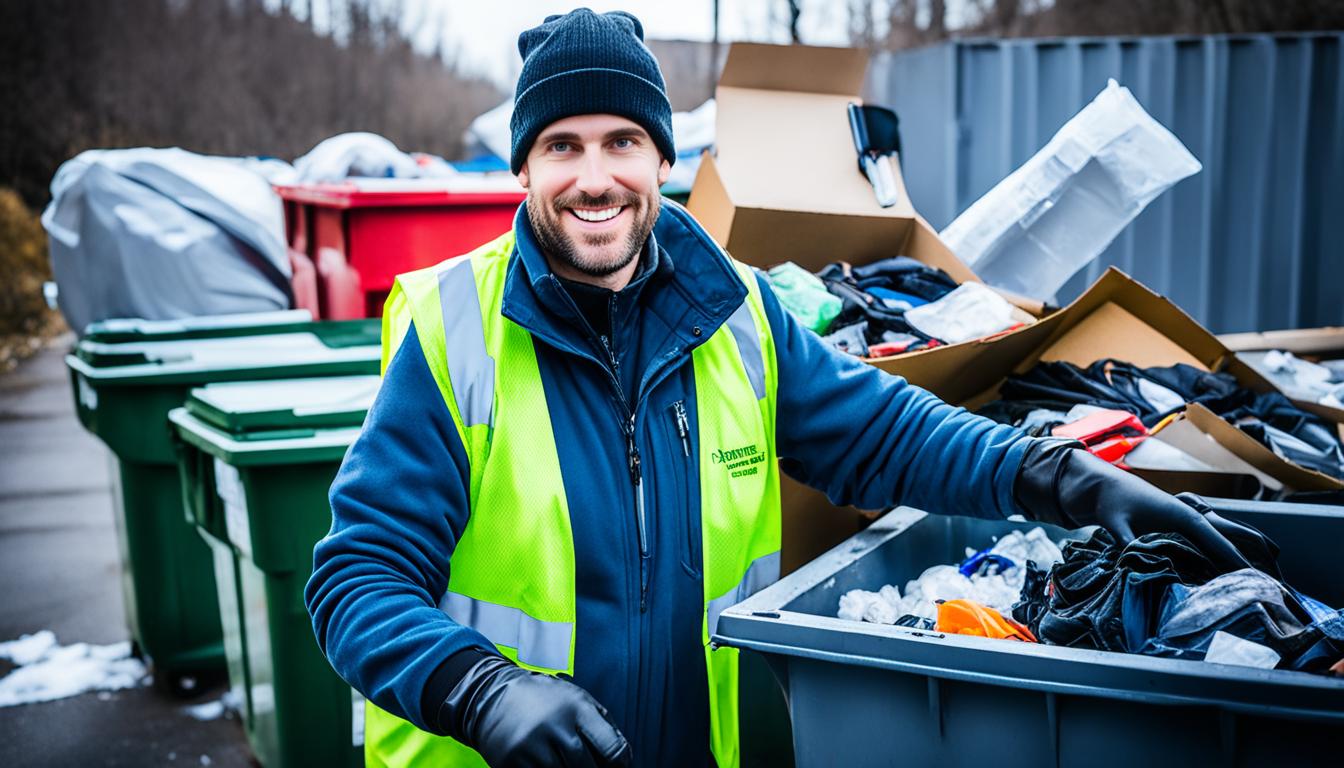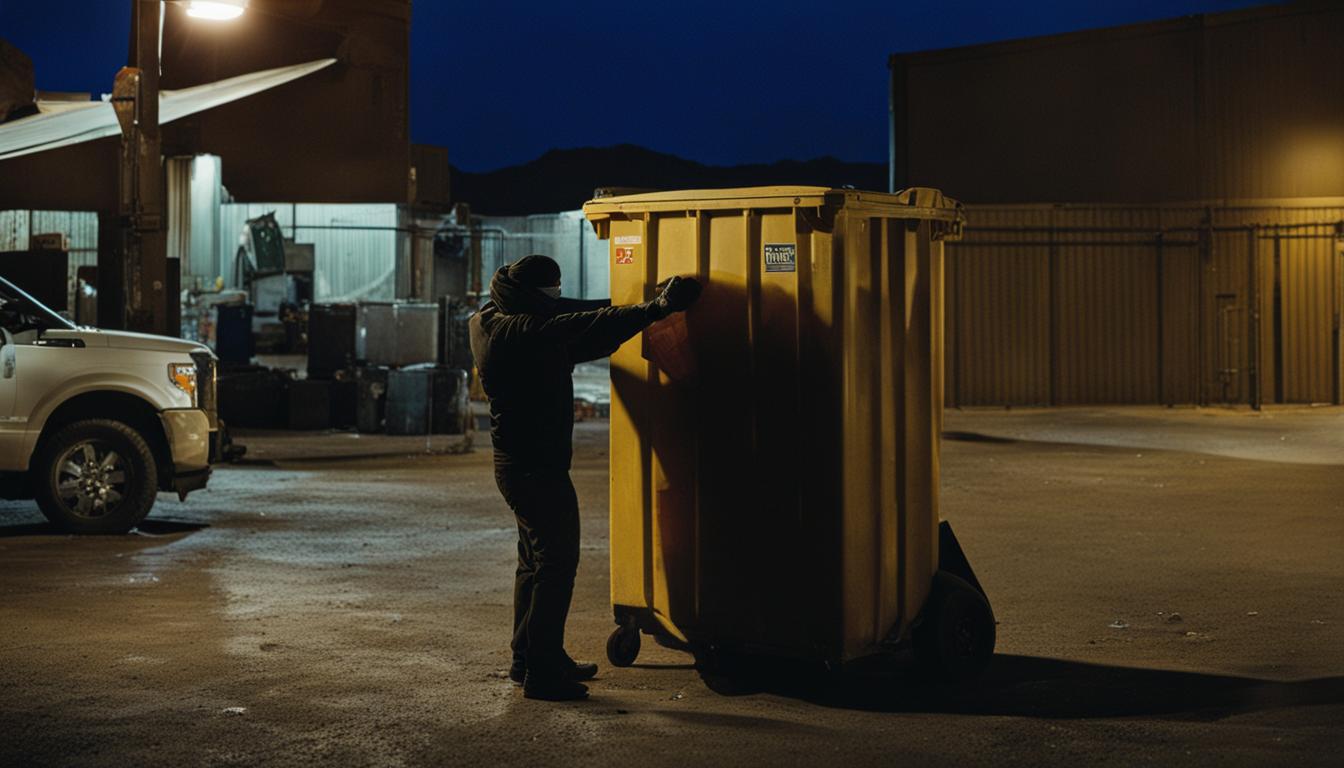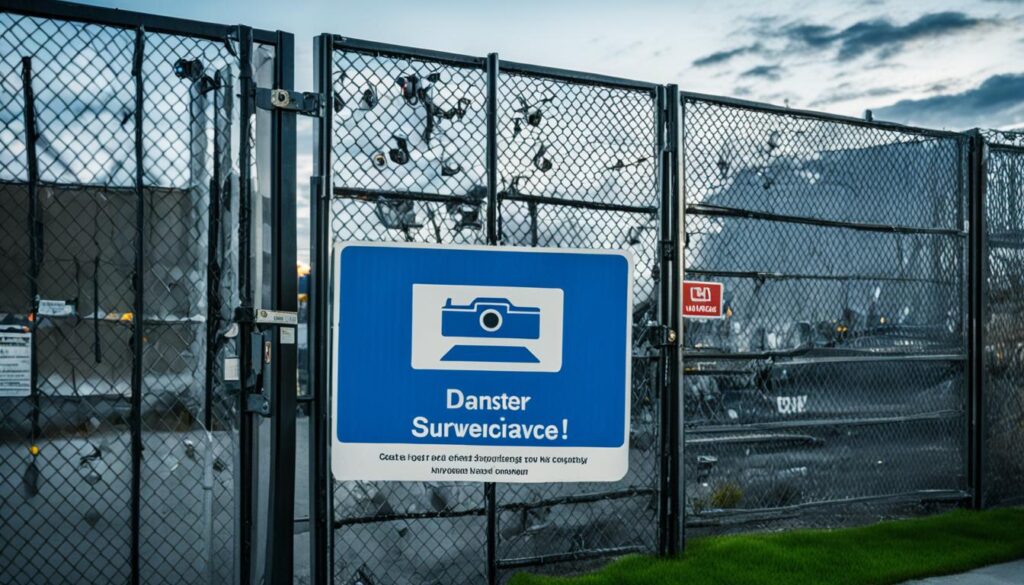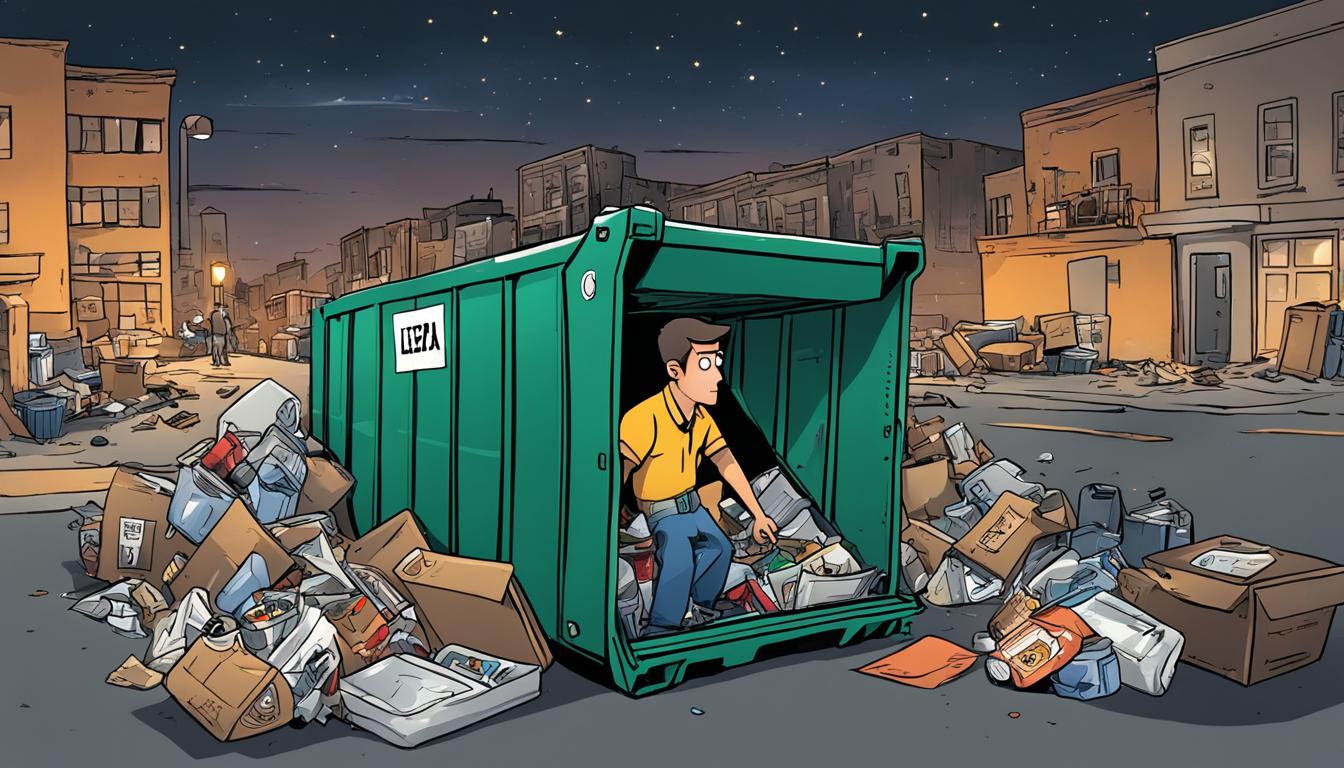Disclosure: This Post Contains Affiliate Links; We earn a commission on purchases.
Welcome to the fascinating world of dumpster diving! If you’re new to this subculture and eager to explore the art of salvaging discarded treasures, you’ve come to the right place. In this beginner’s guide, we’ll give you a crash course in dumpster diving 101, providing you with essential tips, techniques, and safety considerations to ensure a successful and enjoyable experience.
Key Takeaways:
- Dumpster diving is a unique form of urban treasure hunting that involves salvaging discarded items from trash receptacles.
- Before diving into dumpster diving, beginners should familiarize themselves with necessary precautions, legal considerations, and techniques.
- Legal risks and potential offenses associated with dumpster diving vary by location, so it’s essential to research local laws and regulations.
- Safety precautions, such as wearing protective gear and being aware of potential hazards, are crucial for a safe diving experience.
- Finding and choosing the right dumpsters is key. Establishments like grocery stores and thrift stores often discard usable items.
The Legal and Safety Considerations of Dumpster Diving
While dumpster diving may not be illegal in most places, it is essential for beginners to understand the legal risks and potential offenses associated with this activity. While trash is generally not considered private property, certain actions such as trespassing, invasion of privacy, and vagrancy can still raise concerns. Therefore, it is crucial to be aware of and comply with local laws and regulations before engaging in dumpster diving.
Additionally, taking safety precautions is vital to ensure a safe diving experience. Here are some important dumpster diving safety tips and precautions to keep in mind:
- Wear appropriate clothing: Dress in comfortable clothing that provides protection and allows for easy movement. It is advisable to wear dark-colored clothes that blend in with the surroundings.
- Use protective gear: Wear gloves to protect your hands from sharp objects, broken glass, or other hazardous materials you may encounter while diving.
- Bring a flashlight: A flashlight will help you navigate dumpsters and identify potential hazards. It is particularly important if you plan to go diving during nighttime.
- Be cautious of potential hazards: Watch out for sharp objects, insects, rodents, or any other potential dangers that may be present in the dumpsters you explore. Exercise caution while climbing in and out of dumpsters to avoid injuries.
- Be discreet and respectful: Avoid drawing unnecessary attention to yourself while dumpster diving. Respect the privacy and property of others by not leaving a mess behind and returning any items you don’t wish to keep back to the dumpster.
By following these dumpster diving safety tips and legal considerations, beginners can enjoy the benefits of dumpster diving while minimizing any potential risks. Dumpster diving can be a rewarding experience, and with the right precautions, everyone can dive safely and responsibly.
Finding and Choosing the Right Dumpster
One of the key factors in successful dumpster diving is knowing where to find and choose the right dumpsters to dive into. By targeting specific establishments that tend to discard usable or in good condition items, divers can increase their chances of finding valuable treasures. Grocery stores, bakeries, electronics stores, and thrift stores are excellent places to start.
Diving during strategic times can also make a significant difference. Late at night or early in the morning, when businesses are closed, is ideal for dumpster diving. During these periods, dumpsters are more likely to be full of discarded items, increasing the chances of finding something valuable. It’s important to be mindful and respect the operating hours and privacy of the businesses.
Furthermore, developing relationships with employees can be beneficial when it comes to finding the best dumpsters for diving. Establishing rapport and gaining insider tips from employees who regularly dispose of items can provide valuable insights and enhance the diving experience.
Benefits of Choosing the Right Dumpster
Choosing the right dumpster to dive into can yield numerous benefits. Firstly, it increases the chances of finding items that are still usable or in good condition. By targeting establishments that discard items of interest, such as electronics stores or thrift stores, divers increase their odds of discovering valuable treasures.
Additionally, selecting the right dumpster reduces potential risks and hazards. Dumpsters located in well-lit areas with clear access are safer to explore and navigate. By choosing dumpsters wisely, divers can avoid unnecessary obstacles or dangers that may hamper the diving experience.
“Knowing where to find and choose the right dumpsters can significantly impact your diving success. By focusing on establishments that discard valuable items and being strategic about diving times, you can increase your chances of finding hidden treasures.” – Jane Doe, experienced dumpster diver
Overall, thorough research, knowledge of specific establishments, and strategic planning are essential when it comes to finding and choosing the right dumpsters for diving. By leveraging these factors, divers can enhance their chances of unearthing valuable and exciting items during their dumpster diving adventures.
Essential Gear and Preparation for Dumpster Diving
While dumpster diving doesn’t require much equipment, having the right gear can make the experience more efficient and safer. Here are some dumpster diving essentials that every beginner should consider:
- Flashlight: A reliable flashlight is essential for navigating through dark dumpsters and examining potential finds.
- Gloves: Protect your hands from sharp objects, debris, and potential contaminants with a good pair of gloves.
- Sturdy Shoes or Boots with Non-Skid Soles: It’s important to wear footwear that offers stability and protection against any hazards you may encounter.
- Trash Bag: Bring a large, durable trash bag to store your finds or to tidy up the area after your dive.
- Co-Diver: Consider diving with a partner for added safety. Having someone watch your back can provide an extra layer of protection.
Aside from gear, it’s crucial to dress appropriately. Choose dark clothes that blend in with the surroundings to avoid drawing unnecessary attention. Additionally, clothing that offers protection against potential hazards, such as long sleeves, sturdy pants, and closed-toe shoes, is recommended.
Preparation goes beyond physical gear. Beginners should also be mentally prepared for dumpster diving. It’s important to approach each dive with caution, maintaining a quiet and low-key demeanor to minimize any potential disruptions.
Testimonial:
“Having the right gear makes all the difference in dumpster diving. A good flashlight and sturdy gloves are must-haves for me. Dressing appropriately and staying low-key are also essential for a successful dive.”
– Amy Thompson, Experienced Dumpster Diver
Dumpster diving can be an exciting and rewarding experience, so make sure you’re prepared with the necessary gear and mindset to ensure a safe and fruitful adventure.
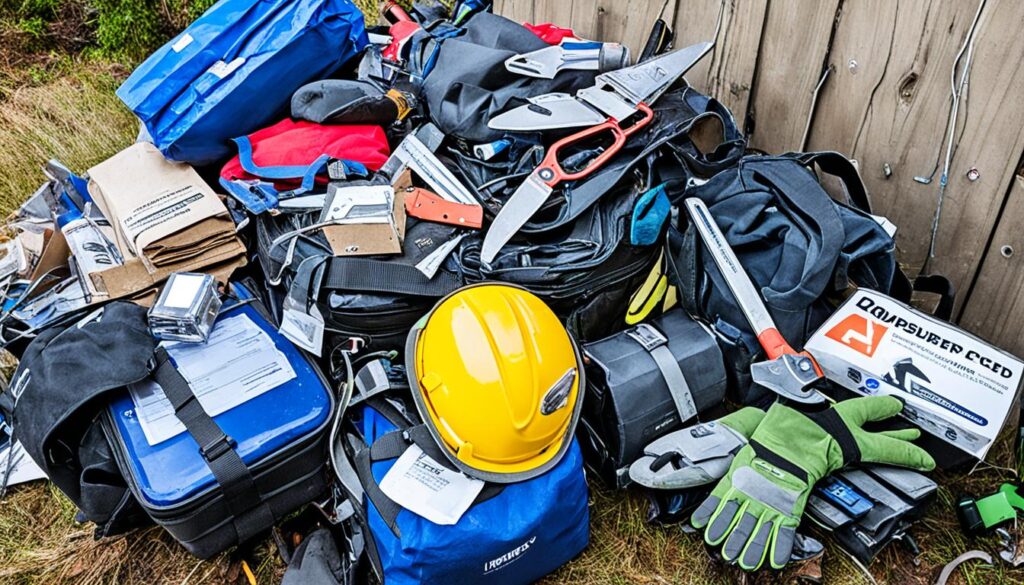
Tips for Successful Dumpster Diving
As a beginner, following these tips and techniques for successful dumpster diving can greatly increase your chances of finding valuable items and having a rewarding experience.
Scout during the Day
Visit potential diving locations during the day to identify unlocked dumpsters. This will save you time and ensure that you don’t waste effort on inaccessible or tightly secured containers.
Target Specific Days
Some businesses have regular schedules for discarding certain items. By researching and targeting specific days, you can increase the likelihood of finding what you’re looking for. For example, grocery stores may throw away fresh produce on specific days, while clothing stores might discard outdated inventory during particular seasons.
Observe Inventory Turnover Patterns
Pay attention to the patterns of inventory turnover at different establishments. This can help you anticipate when new items are likely to be discarded. By being observant and understanding the disposal practices of businesses in your area, you can optimize your diving trips to coincide with the highest potential for finding valuable items.
Exercise Caution and Watch for Hazards
While dumpster diving can be exciting, it’s essential to exercise caution and be aware of potential hazards. Always watch your step and be mindful of broken glass, sharp objects, or other dangerous debris. Wearing sturdy gloves and shoes is necessary for protecting yourself from cuts and injuries.
Handle Finds Carefully
When you discover valuable items in a dumpster, handle them with care. Be gentle to avoid damaging delicate or fragile objects. Clean and sanitize items if necessary, ensuring that they are safe to use or sell.
Maintain Cleanliness and Respect
When dumpster diving, it’s crucial to leave the area as clean as possible. Dispose of any trash or debris responsibly and respectfully. Remember that dumpster diving is a privilege, and respecting others’ privacy, property, and the environment is of utmost importance.
Following these tips will help you become a successful dumpster diver, increasing your chances of finding valuable treasures while practicing mindfulness and consideration towards others.
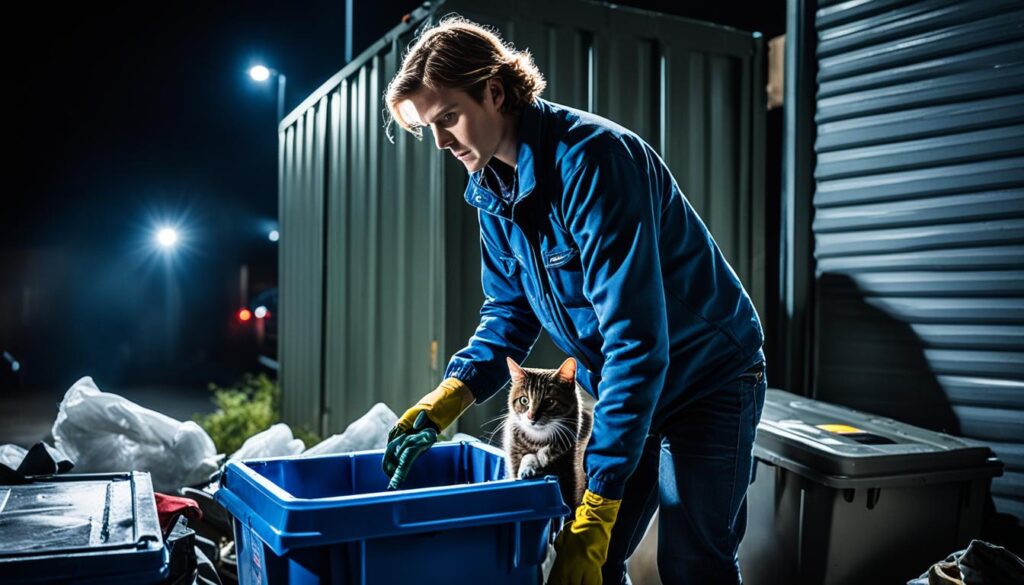
Conclusion
Dumpster diving is a fascinating and eco-friendly activity that offers beginners a chance to reduce waste, save money, and uncover hidden treasures. With the information presented in this beginner’s guide to dumpster diving, individuals can embark on their diving journey with confidence and success. By adhering to legal considerations, following safety precautions, and implementing useful tips, divers can navigate the art of dumpster diving effectively.
It is crucial for aspiring divers to approach this activity with respect and responsibility. Being mindful of the environment and the communities in which one dives is essential. Dumpster diving can be a positive way to contribute to sustainability and engage in recycling efforts.
By acquiring the necessary knowledge, preparing adequately, and maintaining a responsible mindset, beginners can unlock the potential of dumpster diving and enjoy the unique experiences it provides. Whether you are seeking functional items or hidden treasures, this dumpster diving guide will equip you with the tools and techniques needed to make the most out of your diving adventures.
Source Links
- https://matadornetwork.com/life/beginners-guide-to-dumpster-diving/
- https://medium.com/@ThomasDanby/turning-trash-into-treasure-d5c54a8d4c0
- https://www.wikihow.com/Dumpster-Dive

Subscribe to Our Newsletter

